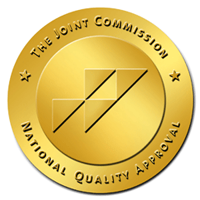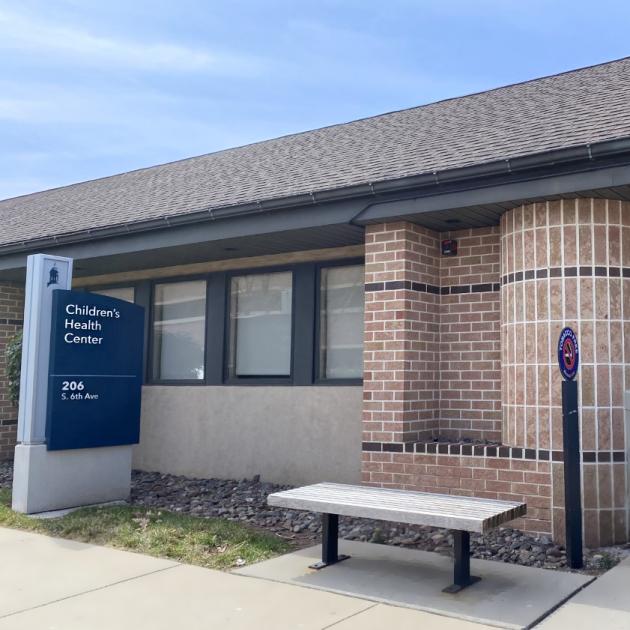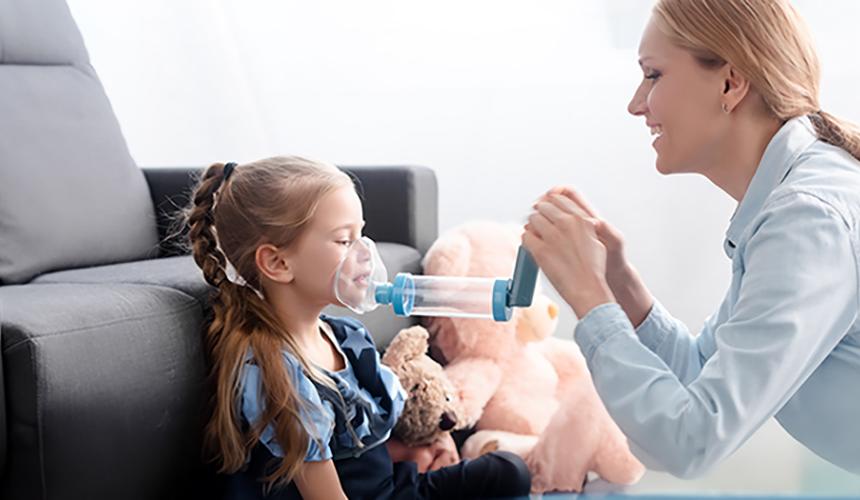Reading Hospital Children's Health Center provides a wide range of comprehensive, compassionate outpatient services to patients from newborn through age 18 in a family-friendly environment.
Mission Statement
The mission of the Children’s Health Center is to provide compassionate, accessible, appropriate, and comprehensive care to pediatric patients regardless of ethnic or financial status; to respect the confidentiality and dignity of our patients and to work cooperatively with the healthcare providers, health support resources, and community agencies to meet the needs of the patients and to educate their parents and or guardians.
We offer the following services:
- Physical exams including well-child visits, and school/sports physicals
- Preventive medicine
- Immunizations
- Newborn care and lactation consultation
- Multiple and premature births
- Joint Commission Asthma Certified
- Hearing and vision screening
- Developmental issues and behavioral evaluations
- Acute and chronic illnesses
- Sick visits - colds, ear infections, fevers, skin rashes, sore throat, stomach pain, etc.
- Nutritional guidance
- Adolescent concerns
- Weight management care
- Referrals to specialists (when needed)

Joint Commission Certification of Distinction in Pediatric Asthma
Centering Healthcare Connects You with Others
Our Centering Healthcare programs bring together women’s healthcare experts and a small group of moms-to-be or new moms to learn about mother and baby health and connect with other women. Centering Healthcare connects you with others during sessions that focus on improving health, reducing health risks, and enhancing the well-being of mothers, babies, and families. Meetings always allow extra time to connect with other participants and share experiences.

Pregnancy
CenteringPregnancy teaches groups of eight to 12 expectant mothers with similar due dates, about pregnancy, childbirth, and parenting. During monthly meetings, a healthcare provider provides personal health assessments and education. This program improves your health, self-image, and self-care during pregnancy. Guided discussions allow individuals to share concerns and ask questions in a comfortable, supportive environment.

Parenting
CenteringParenting groups meet every one to three months and offer parents a chance to find education and community. Families with children under one year meet with a pediatric expert for well-child health assessments, immunizations, and development screenings. Meetings give you time to bond with your baby while focusing on your own health goals, such as weight control, stress management, nutrition, and family planning.
FAQs
- I think my child has a fever. When should I worry?
- If your infant is less than two months old or has not yet received their newborn vaccines, then a rectal temperature of 100.4 or higher requires immediate medical attention in a pediatric emergency room.
- If your child is older than two months old and has received their newborn vaccines, the number of days of fevers and your child's overall appearance becomes more important than the actual height of the fever.
- If your child is older than two months old and has received their newborn vaccines, for fevers you can give a weight-based dose of acetaminophen (Tylenol) every four hours as needed.
- If your child is older than six months old and has received their newborn vaccines, for fevers you can give a weight-based dose of ibuprofen (Motrin/Advil) every six hours as needed so that they remain comfortable and able to tolerate fluids.
- If your child's fevers are not improving after three days or if you are noticing ear pain, please call during our office hours to schedule a same-day office visit. If you already have a well-visit appointment scheduled, there is no need to cancel. We will be able to evaluate the fever or illness at the time of the visit.
- Anytime your child has persistent difficulty breathing, decreased urine output, not making tears, or more than five days of fevers over 101.0, then you should have them evaluated right away at your nearest pediatric emergency room.
- When should my child be seen in the office vs. urgent care vs. the emergency room?
- Reading Hospital Children Health Center is your first stop for your child's pediatric and preventative care needs:
- Annual well-one-year-old visit, immunizations, school/sports/driver physical
- Management of chronic concerns such as asthma, ADHD, constipation, belly pain, and more
- Same-day sick visits (ear infections, sore throat, colds, rashes, and more)
- Urgent care is ideal for specific concerns in children over two years old
- Minor injuries such as ankle sprain
- Strep or COVID testing
- Pediatric Emergency Departments are for life-threatening medical emergencies!
- Fevers over 100.4 in newborns
- Persistent respiratory distress (your child is struggling to breathe or can't catch their breath even after you've tried nasal saline and bulb suction)
- Dehydration requiring IV fluids
- Major trauma or orthopedic injuries that may require imaging or casting
- Wounds that may require stitches or staples
- Reading Hospital Children Health Center is your first stop for your child's pediatric and preventative care needs:
- When should I call the office vs. sending a MyTowerHealth message?
- Call during our office hours if:
- General questions or advice is needed
- You would like to schedule an appointment
- Call during our after-hours to speak to the on-call physician if:
- You are concerned that your child is having a medical emergency and you are unsure if you should go to the emergency department
- Please be aware: The on-call providers are not able to schedule appointments so you would call the following morning when the office re-opens to schedule an appointment
- Use MyTowerHealth for:
- Non-urgent questions or concerns
- Non-urgent updates or follow-ups for your child’s primary care provide
- You are also able to send photos via MyTowerHealth
- Medication Refills
- Please note that controlled substance prescriptions such as ADHD medications may take three to five days to be refilled. Therefore place your request at least five days before running out.
- Please be aware: MyTowerHealth messages are reviewed every 24-72 hours. If your child is having a true medical emergency, please call the office or 911.
- Call during our office hours if:
- What should I do if my child has a cold?
- Your child likely has a cold if they have an abrupt increase in runny nose, cough, congestion, or fussiness with or without fevers.
- In order to keep them comfortable and safe right away, you would want to:
- Increase their fluid intake
- Use nasal saline drops followed by bulb suction or have them blow out their nose if able
- Run a humidifier
- Keep their head elevated if they are over two years old
- Call our office if their symptoms are not improving after three to five days or sooner if worsening
- What should I do if my child has seasonal allergies?
- Your child likely has seasonal allergies if they have had a persistent clear runny nose for several weeks with or without sneezing and itchy watery eyes. In general, they would typically have good energy and appetite and no fevers.
- To decrease their symptoms, you would do the following:
- For children over three years old, give 5ml of children’s loratadine (Claritin) or cetirizine (Zyrtec) every day consistently throughout the season
- For children over six years old, give 10ml of children’s loratadine (Claritin) or cetirizine (Zyrtec) every day consistently throughout the season
- For watery, itchy eyes, apply one drop of over-the-counter Zaditor to both eyes twice daily followed by a cool compress for seven days
- Follow up in the office if symptoms are not improving after two to three days
- Be sure to have them shower and change clothing after playing outside
- Keep their windows closed to keep out allergens
- Change their bedding frequently to decrease the build-up of allergens
- What should I do if my child has a new food allergy?
- Call 911 immediately if your child has difficulty breathing, tongue or lip swelling
- Ok to monitor at home, if your child only has one symptom such as hives or rash
- Give a weight-based dose of children’s diphenhydramine (Benadryl) every eight hours as needed
- Rinse any food off of their face, hands, or body with cool water
- Avoid the food until directed by your child’s provider
- What should I do if my child has constipation?
- It can be normal for your infant or child not to have a bowel movement every day or every few days, as long as they are passing gas, there is no blood in their stool and they are continuing to feed well
- If your infant is very uncomfortable and having painful bowel movements
- Start by moving their legs in bicycle movements
- Gently massage their belly or offer tummy time
- If over four months old, offer 2 oz. of pureed prunes one to two times daily
- For children over one year old with constipation
- Increase water and fruit (prunes, pears, pineapples) intake
- Limit binding foods such as bananas, peanut butter, and heavy starches
- Follow up with your child’s PCP if a stool softener is needed
- When should I switch my child's car seat or booster?
- To maximize safety, keep your child in the car seat for as long as possible, as long as the child fits within the manufacturer’s height and weight requirements
- Children should be in a rear-facing 5-point harness car seat until they have exceeded the maximum requirement of your car seat. Please keep in mind this may be long after their Second Birthday
- Children should remain in a booster until they have reached four feet nine inches or exceeded your car seat's maximum requirement. This should not be based on weight or age alone
- For more detailed information from the National Highway Traffic Safety Administration, please read these recommendations.
- Common Vaccine Myths - Busted!
- "Vaccines make you sick" = False
- Vaccines teach your immune system how to fight off the illness that your child is being vaccinated against. Sometimes when your immune system is activated you may have low-grade fevers, temporary aches, and fatigue. You may also see swelling and redness at the injection site. These symptoms are mild and self-resolve within one to two days.
- "Vaccines cause autism" = False
- Countless research studies throughout the world have confirmed that there is no link between vaccines and autism.
- "Alternate vaccine schedules are just as effective" = False
- The efficacy of alternate vaccine schedules has not been extensively studied compared to the decades of research that went into developing the current recommended vaccine intervals and guidelines. Alternate vaccine schedules may also increase the risk of errors and leaves your child susceptible to preventable diseases in the meantime.
- "Vaccines make you sick" = False
- I never get my flu shot, why should I get it for my child?
Children with the flu or influenza can typically have high fevers for long periods of time in addition to runny nose, cough, congestion, and vomiting. Receiving the annual flu vaccine helps them fight off the virus so that their symptoms are milder and shorter.
- At what age should my daughter begin seeing a gynecologist?
Technically at any age, if she is experiencing painful or irregular menstrual cycles. We recommend Tower Health Medical Group Obstetrics & Gynecology - Wyomissing Reed Ave Health. You can call 610-898-7000 to schedule an appointment.
- At what age should my child transition to an adult provider?
- We provide medical care from birth to 18 years of age. Around 17 years of age, we will begin helping your young adult make that transition by having them take the lead on their health concerns.
- Call 1-833-34-TOWER to set up a new patient appointment at the numerous Family Medicine or Internal Medicine offices in our area.


